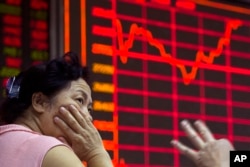China saw the release of negative data for factory production over the weekend, more bad news for an economy that has showed signs of struggling in recent months. But despite the negative headlines and its faltering stock market, some analysts see opportunities.
Raymond Yeung, a senior economist with ANZ in Hong Kong said that as long as the government can stabilize, he thinks the prospects for the economy are still promising.
“Some of the volatility that you see at the moment in the equities market and also in the exchange rate market will subside in three or six-months time,” Yeung said.
Yeung said he does not expect China to see 7 percent growth this year or double-digit growth in the manufacturing sector, but for some sectors such as e-commerce and the service sector, the situation should look brighter.
No 'hard landing'
Speaking at the World Economic Forum late last week, China’s Premier Li Keqiang predicted that the Chinese economy would not experience a hard landing or a sharp decline in growth. But officials admit that maintaining 7 percent, while achievable, is not going to be easy.
“China’s economy is trending well as it slows down in pace towards increasing stability, though not without difficulties, the general picture shows more opportunities than challenges,” he said.
One of the key goals of China’s economic transition is to shift away from an over-reliance on exports to focus more on domestic consumption and in a growing number of ways, Chinese consumers are doing just that.
Sales at China’s box office this year are booming, surpassing last year’s total of $4.65 billion in early September. Sales are expected to soar as high as $7 billion by the end of the year, even at a time when the economy is slowing. Last year, box office sales in North America were more than $10 billion.
China’s service sector is also making growing contributions to the economy and Chinese tourists are also increasingly traveling abroad, despite concerns about safety.
Reuben Mondejar, a business professor at the City University of Hong Kong said that even incidents such as the recent bombing in Bangkok are unlikely to deter tourists from traveling overseas. Chinese tourists have minds of their own.
“As if a bomb in Bangkok will deter them. We’ve seen that it does not. The big military parade in China, those three days of holidays, where did the Chinese tourists go? Mondejar asked. “Their number one destination was Japan, precisely the target of the military parade.”
Risks and reforms
Mondejar said he hopes the economy continues to grow, because there are big risks, if it does not.
“The main reason why the Communist Party survived is its able to deliver the economic goods,” he said. “If it stops, then what we are seeing with the migrants crisis in Europe that’s peanuts.”
The Communist Party is aware of the risks and has been aggressively pursuing reforms to breathe life into the economy and unlock new paths for growth. But those steps come after steep drops on China’s faltering stock markets that have dented the government’s reputation for shrewdly managing one of the world’s biggest economies.






